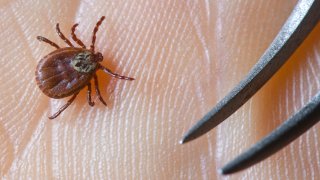
21 January 2020, Brandenburg, Sieversdorf: A tick crawls over one hand. Photo: Patrick Pleul/dpa-Zentralbild/ZB (Photo by Patrick Pleul/picture alliance via Getty Images)
Illinois officials are urging residents to check themselves and loved ones for tick bites while outside, reminding that the insects can carry a host of diseases.
According to the Illinois Department of Public Health, people should check themselves, their pets and their children for ticks after spending time near wooded areas, tall grass and brush.
Here are some tips to avoid bites:
- Walk in the center of outdoor trails, avoiding wooded, busy areas with high grass and leaf litter
- Wear light-colored clothing, which make ticks easier to find. Tucks pants into socks and boots, if possible
- Apply an EPA=registered insect repellent "containing 20% DEET, picaridin, IR3535, or Oil of Lemon Eucalyptus according to label directions"
- Conduct full-body tick checks on family members every two to three hours. Check gear or pets, as well
- Put clothes in the dryer on high for 10 minutes -- or one hour for damp clothes -- to kill ticks
- Bathe or shower within two hours after coming indoors
- If you find a tick on yourself, IDPH recommends keeping the insect for species identification. Place the tick in rubbing alcohol or in a sealed container and bring to a health care provider
Feeling out of the loop? We'll catch you up on the Chicago news you need to know. Sign up for the weekly Chicago Catch-Up newsletter here.
For information on removing ticks and symptom identification, click here.
Ticks may carry Lyme disease, as well as Rocky Mountain Spotted Fever, Tularemia, Ehrlichiosis and Babesiosis, according to health officials. Removing ticks within 24 hours of a bite can reduce the risk of these diseases.
Should a person become ill with a fever or rash after being in an area where ticks are commonly found, the individual should contact a health care provider. Health officials warned that some tick-borne illnesses can be life-threatening.
Local
To track ticks in your area, click here. For more information, click here.